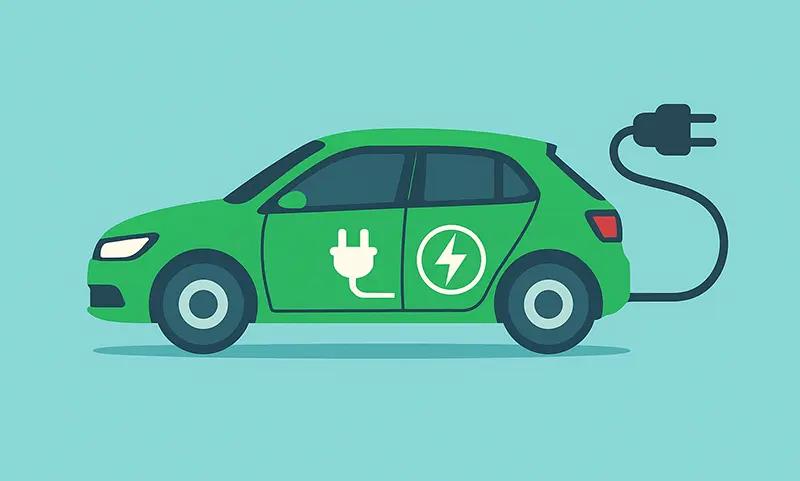Considering an electric vehicle (EV)? Now is the time to plan.
Starting in April 2025, the UK introduced significant changes to how electric vehicles (EVs) are taxed, affecting both private owners and those using salary sacrifice schemes. At Plan A Financials, we’re here to help you navigate these upcoming changes and make the most of the potential savings.
Are Government Grants for EVs Coming Back?
From July 2025, the UK government has reintroduce grants to support private buyers of electric vehicles. This is in response to a dip in EV adoption and forms part of the government’s broader efforts to meet Net Zero targets ahead of the 2035 ban on new petrol and diesel cars.
How much is available?
There are two tiers of support:
- Up to £3,750 off new EVs with the cleanest manufacturing credentials (Band 1)
- Up to £1,500 off moderately sustainable vehicles (Band 2)
To qualify, the vehicle must cost less than £37,000 and be purchased for private use (not through a company fleet or salary sacrifice scheme). The grant is applied automatically at the point of sale, no paperwork required from the buyer.
Who qualifies for the grant?
The scheme is primarily aimed at private individuals, particularly working households and those on lower incomes. Vehicles must meet strict sustainability and emissions standards, with some models from higher-polluting manufacturers being excluded.
Additional funding will also be available to improve access to public and home charging infrastructure, particularly for properties without off-street parking, as well as public sector and community transport schemes.
While no official “Plug-in Car Grant” has returned yet, government announcements suggest that incentives for EV adoption will continue, especially as we approach the 2035 deadline.
At Plan A Financials, we’re monitoring this closely and will notify clients as soon as new grants or incentives become available.
What’s Changing in Vehicle Excise Duty (VED)?
For years, fully electric vehicles enjoyed a £0 rate of Vehicle Excise Duty (VED). This exemption will end in April 2025:
- First-year VED charge: EVs registered from 1 April 2025 will be liable for £10 in their first year.
- Standard rate from year two onwards: From the second year of registration, EVs will pay £195 per year (2025/26 rate), which aligns with the VED for petrol or diesel cars.
- Expensive Car Supplement: EVs costing over £40,000 will also be subject to the £425 supplement for five years, starting from the second year of registration.
While EVs will no longer be tax-free, they will still be more cost-effective than most petrol or diesel vehicles in terms of VED.
What About People on PIP (Personal Independence Payment)?
For individuals receiving PIP, the rules surrounding VED exemptions and Motability support remain in place. Disabled drivers receiving the higher mobility rate of PIP may still qualify for full VED exemption or a 50% reduction depending on circumstances. However, if the vehicle is provided through a company car rather than Motability, the Expensive Car Supplement or BIK charges may still apply.
If you’re considering an EV, either personally or through your employer, it’s worth seeking tailored advice to ensure you don’t miss out on VED exemptions or tax reliefs available to you.
Benefit-in-Kind (BIK) Rates on Company Electric Cars
For employees using EVs via salary sacrifice schemes, the Benefit-in-Kind (BIK) tax will apply:
- 2024/25 tax year: 2% of the vehicle’s list price (P11D value)
- 2025/26 tax year: Rising to 3%
- 2026/27 onwards: Increasing by 1% each year until it reaches 5% by 2027/28
Although EVs will remain tax-efficient in the short term, BIK charges are set to rise gradually over the next few years. These increases are already set in legislation, offering predictability through to 2028/29.
EVs and Salary Sacrifice – Example
Let’s say you’re considering a fully electric car costing £40,000 (P11D value). Here’s how salary sacrifice compares with a private purchase:
Salary Sacrifice
- BIK rate (2025/26): 3%
- Taxable Benefit: £40,000 × 3% = £1,200
For a basic-rate taxpayer (20%):
£1,200 × 20% = £240 per year
That’s just £20.00 per month in tax for using a £40,000 electric car!
Even with the £195 VED and the potential £425 Expensive Car Supplement (if the car’s list price exceeds £40,000), it’s still more tax-efficient than running a petrol or diesel vehicle via salary sacrifice.
Private Purchase
- No BIK tax to pay.
- You pay for the car from post-tax income.
- You’ll also pay VED from April 2025: £10 for the first year and £195 standard rate in year two, plus the £425 supplement if the car’s price exceeds £40,000.
Quick Comparison:
| Particulars | Salary Sacrifice | Private Purchase |
|---|---|---|
| BIK Tax (20% taxpayer) | £240/year | £0 |
| Pays Full Car Cost? | No (via salary) | Yes (from net income) |
| VED from April 2025 | £195/year | £195/year |
| NIC Savings Possible? | Yes | No |
Bottom Line: Salary sacrifice is usually the cheaper option because it allows you to reduce taxable income and take advantage of employer fleet discounts.
Plan A Financials – Here to Help You Drive Smarter
At Plan A Financials, we specialise in:
- Personal and business tax advice
- Employer salary sacrifice schemes
- Efficient structuring of car purchases or leases
And, by partnering with trusted car finance providers, we can help you secure competitive EV finance deals that may save you thousands.
Talk to Us Today
Ready to make the switch to electric or check if your current arrangements are tax-efficient? Get in touch with us at Plan A Financials:
📞 Call us at: 01277 236 246
✉️ Email: info@plan-a.co.uk

